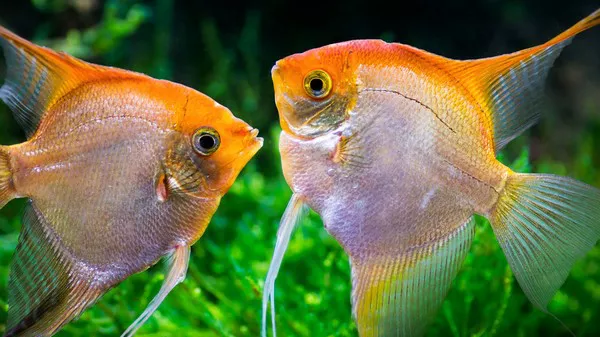Angelfish, known for their vibrant colors and graceful movements, are popular choices among aquarium enthusiasts. Beyond their aesthetic appeal, these freshwater fish exhibit intriguing social behaviors that captivate the interest of hobbyists and researchers alike. One question that often arises in the realm of angelfish behavior is whether they have the capacity to change partners. In this article, we will delve into the social dynamics of angelfish and explore the factors that may influence their pairing and potential for partner changes.
The Social Structure of Angelfish
Angelfish are renowned for their monogamous tendencies, forming strong pair bonds that often endure for a significant portion of their lives. These pair bonds are crucial for breeding success, as angelfish engage in cooperative behaviors such as guarding their eggs and fry. Observing these intricate social structures in the aquarium setting is both fascinating and rewarding for enthusiasts.
Pair Bond Formation
Angelfish typically form pair bonds through a courtship process that involves intricate displays of behavior. During courtship, potential mates engage in a dance-like routine, where they swim together, flare their fins, and exhibit vibrant coloration. This courtship ritual is a crucial precursor to the formation of a pair bond, signaling compatibility between individuals. Once a pair bond is established, angelfish become highly territorial, defending their chosen breeding site from other fish in the aquarium.
Factors Influencing Pair Stability
While angelfish are known for their monogamous tendencies, various factors can influence the stability of their pair bonds. Environmental conditions, tank mates, and overall aquarium dynamics play a role in shaping the social interactions of angelfish. For instance, changes in water parameters or the introduction of new tank mates can sometimes lead to disruptions in established pair bonds.
Environmental Changes and Pair Bond Stability
Angelfish are sensitive to changes in their environment, and alterations in water quality or tank conditions can impact their behavior. Sudden fluctuations in temperature, pH levels, or water hardness may induce stress in angelfish, potentially affecting their pair bond stability. It is crucial for aquarium enthusiasts to maintain stable and optimal conditions to support the well-being of angelfish and foster strong, lasting pair bonds.
Tank Mate Dynamics
The presence of other fish in the aquarium can also influence the social dynamics of angelfish. While they form strong pair bonds, interactions with tank mates may vary. In some cases, the introduction of new fish may trigger territorial disputes, leading to shifts in pair dynamics. Additionally, aggressive tank mates may pose a threat to the stability of angelfish pair bonds, emphasizing the importance of carefully selecting compatible tank mates.
Observing Changes in Pair Dynamics
Enthusiasts should pay close attention to the behavior of their angelfish to identify any potential changes in pair dynamics. Signs of stress, aggression, or avoidance between formerly bonded individuals may indicate underlying issues. Regular observation and understanding of angelfish behavior will enable hobbyists to intervene promptly if necessary and create an environment conducive to stable pair bonds.
Can Angelfish Change Partners?
The question of whether angelfish can change partners is a topic of debate among aquarium enthusiasts. While angelfish are generally monogamous and form enduring pair bonds, there have been instances of individuals changing partners under specific circumstances. Environmental stressors, incompatible tank mates, or disruptions in the aquarium setting may contribute to the dissolution of established pair bonds, prompting angelfish to seek new mates.
Environmental Stressors and Partner Changes
One scenario in which angelfish may change partners is in response to prolonged environmental stress. If the aquarium conditions become consistently unfavorable, it can lead to increased stress levels among angelfish, potentially affecting the stability of pair bonds. In such cases, individuals may exhibit a preference for new partners, seeking companionship that provides a sense of security in the face of challenging conditions.
Tank Mate Compatibility and Partner Dynamics
The compatibility of tank mates plays a crucial role in maintaining stable angelfish pair bonds. Aggressive or disruptive tank mates can lead to increased tension within the aquarium, potentially resulting in the dissolution of existing pair bonds. Angelfish may then explore new partnerships as a response to the need for a more harmonious social environment.
See Also: A Guide to Recognizing Angelfish Reproduction Egg-Carrying
Reintroduction of Angelfish to the Aquarium
In some instances, angelfish may change partners when reintroduced to the aquarium after a period of separation. This can occur during breeding projects or when angelfish are temporarily housed in separate tanks. Upon reintroduction, individuals may reassess their pair bonds, and changes in social dynamics may occur. Understanding the potential for partner changes in these situations is essential for aquarium enthusiasts managing breeding programs or participating in community-driven conservation efforts.
Conclusion
In conclusion, angelfish are captivating creatures with complex social behaviors that add depth to the aquarium hobby. While they are generally monogamous and form enduring pair bonds, various factors, such as environmental stressors and tank mate dynamics, can influence the stability of these relationships. The question of whether angelfish can change partners is not a straightforward one, as it depends on the unique circumstances of the aquarium environment.
As responsible caretakers of these beautiful fish, it is crucial for enthusiasts to create and maintain optimal conditions that support the well-being of angelfish and foster stable pair bonds. Regular observation, attention to water quality, and thoughtful consideration of tank mate compatibility are key elements in ensuring a harmonious environment for angelfish to thrive. By understanding the social dynamics of angelfish and the factors that may contribute to partner changes, aquarium enthusiasts can enhance their ability to provide a fulfilling and enriching experience for these fascinating freshwater inhabitants.
Related Topics:
How Long Do Angelfish Eggs Take to Mature?
How Many Male Angelfish Can Live Together
Do Angelfish Ever Stop Laying Eggs?
























